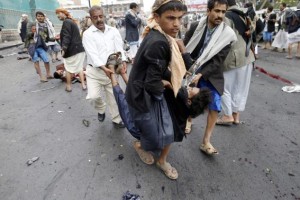
(Reuters) – At least 20 people were killed on Thursday when a suicide bomber detonated an explosives-laden belt in a district of the Yemeni capital where supporters of Shi’ite Muslim Houthi movement were to have held a rally, witnesses said.
A Reuters witness counted at least 20 bodies after the attack on a checkpoint held by the Houthis, the country’s main power brokers since their paramilitary forces seized the capital on Sept 21 following weeks of anti-government demonstrations.
The attack occurred just hours after a political showdown between the Houthis and President Abd-Rabbu Mansour led to the resignation of Prime Minister Ahmed Awad bin Mubarak, whose appointment on Tuesday had angered Houthi leaders.
Many people were wounded in the bombing in central Tahrir Square, other witnesses told Reuters. The Houthis’ al-Masirah television station put the death toll at 32.
A policeman guarding a local bank near the scene said a man apparently wearing a suicide belt approached the Houthi checkpoint. “He then exploded amidst the (Houthi) security and ordinary people nearby,” the policemen told Reuters.
No one has claimed responsibility for the attack, but the incident appears to mirror previous bombings carried out by Al Qaeda in the Arabian Peninsula (AQAP), which see members of the minority Zaydi sect of Shi’ite Islam as heretics.
Western and Gulf Arab countries are worried that instability in Yemen could strengthen al Qaeda and have supported a U.N.-backed political transition since 2012 led by Hadi meant to shepherd the country to stability after decades of autocracy.
PROTEST
A new Yemeni government is due to be appointed under a power-sharing accord signed last month aimed at bringing the Houthis into government. Once a new administration is nominated the Houthis are meant to withdraw their forces from the city, allowing the army and police to resume their duties.
The Houthis on Wednesday rejected Hadi’s nomination of bin Mubarak as prime minister, and bin Mubarak announced early on Thursday he had agreed not to take up the position.
Houthi followers had been preparing to demonstrate in Tahrir Square on Thursday to voice opposition to the nomination of bin Mubarak, previously the head of Hadi’s office, on the grounds that his selection had been imposed by Washington. The United States has denied the allegation.
The Houthis said the protest would proceed despite the attack, and thousands of supporters, some of them armed, began converging on the square.
“This terrorist attack would not deter us from holding this demonstration,” a local organiser told Reuters.
“UNACCEPTABLE MISTAKE”
The Houthis said they had foiled another attack by two cars on the square earlier in the morning, destroying one vehicle, while attackers in a second car managed to escape.
The Houthi capture of Sanaa has alarmed Saudi Arabia, the world’s top oil exporter which shares a long border with Yemen, and other conservative Gulf Arab states.
On Wednesday evening Houthi leader Abdulmalik al-Houthi called for mass protests against “foreign interference” he said was behind the appointment of bin Mubarak.
“I assert that together with these marches tomorrow, God willing there will be important steps that will contribute to correcting this mistake, which is an unacceptable mistake,” Houthi said.
(Reporting by Mohammed Ghobari; Writing by Sami Aboudi; Editing by William Macleanand Dominic Evans)







